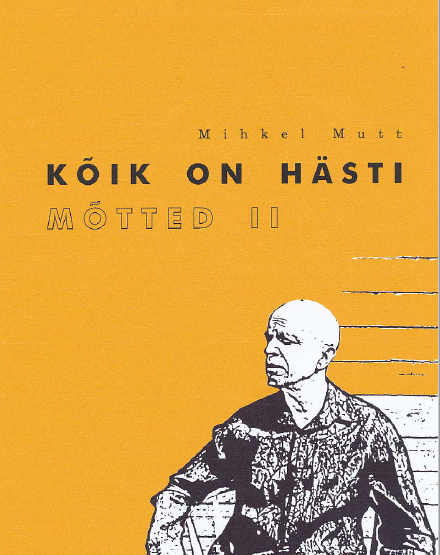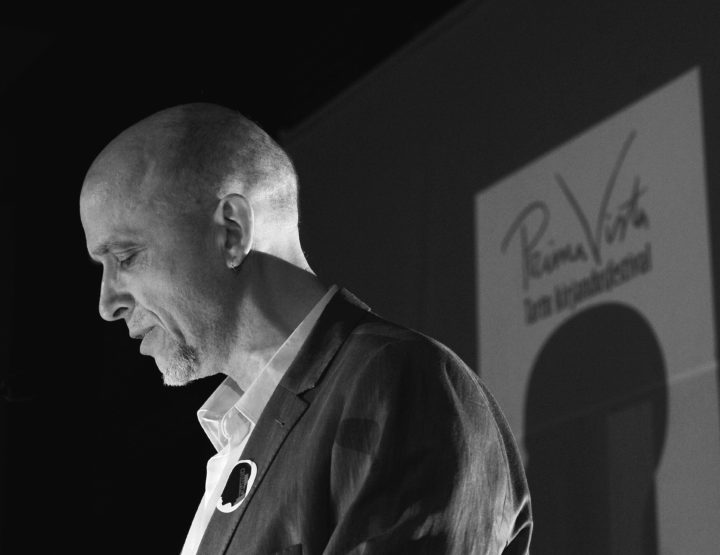Taking a closer look at cultures of different countries, we often discover similar positions. People occupying those positions fulfil more or less similar functions. It is said, for example, that ‘x is our Strindberg’, ‘y is the latter-day Picasso’, ‘z a theatre innovator like Grotowski’, etc. These positions are called invariants. There are people, however, whose role in their domestic culture is nothing less than unique, which makes it difficult to draw any parallels when trying to introduce them. In Estonia, Mati Unt belongs among such people. He is simultaneously a first-class writer, theatre director, critic and columnist, scenographer and ideologue.
Unt started his activity in the early 1960 as a wunderkind. His secondary school graduation essay developed into a novel that immediately made him famous. The novel was followed by numerous short stories, short novels and plays. Elderly critics fondly called him a born writer and future classic. Whatever Unt applies his style to becomes wondrously supple and flexible. He does not use any elaborate images or rare words, thus demonstrating that the most important aspect of prose is rhythm. Unt wrote about art, love and urban life. Despite not having written much fiction over the last 10 years, he is still to be found among the top ten in popularity.
More or less at the same time as the start of his writing career, Unt established relations with theatrical circles. The official trend in theatre in the Soviet Union at that time was Stanislavski’s realism. The ideological constraints in the second half of the 1960s slackened, and new ideas from the West reached Estonia – Brook, Artaud, Grotowski, Barba, etc. Following such principles in staging was also a protest against the official regime. Among young theatre directors, Unt had the role of a critic-ideologue who translated many texts, several of which were published in manuscript almanacs.
It was thus only natural that such a long stay in theatre would lead to independent productions. The first were the arrangements of poetry programmes in 1977. Since then Unt has never looked back. Soon he will have staged one hundred plays. Not all are pure gold of course, but there are quite a few that most certainly are. In 2000, he received the annual best theatre director award in Estonia.
Unt seems to express two main themes in theatre. As a writer-psychologist he is interested in the personality of actors. On the other hand, he is a conceptualist and a free spirit through and through, in the sense that he regards theatre as an independent art. He would never simply bring an excellent play or literary work to the stage. He, working within his own vision, is the author of the production: he always has something of his own to pursue. This frequently confuses the literature-centred critics, at times driving them mad.
Unt’s biggest successes usually occur when he manages to harness the actor’s psychophysical peculiarity and psychoanalytical genotype to his own overall concept and (often grotesque) metaphors. He is an extremely theatrical person, both in life and in art.
Besides theatre work, Unt has, over the last dozen years or so, continually published reviews, columns and the like in the press. He has even invented a new genre, ‘mundane mythology’, combining subjective style and the charm of parasitic scholarship. He writes regular columns for our cultural weekly.
Such brisk cultural activity can partly be explained by the fact that Unt is an artistic person, who is not too interested in the rest of the world. He thirsts for art-life, not life. Although he occasionally likes to pick mushrooms in the forest and have a stroll on a beach, he does not devote very much time to the mundane world. Whatever the initial topic of conversation, pretty soon he is talking about the latest production or exhibition or the like. Although he, too, has had families, wives and children, they seem to fade into the background.
But all the above-mentioned is not quite enough to enthuse over Unt, as so often happens in Estonia. As in any other country, Estonia has other good writers and more than one good theatre director. We also have other personifications of pure art. Unt’s unique role in Estonia has been that of the ‘conveyer of ideas’. Concepts that happen to be the rage abroad, have been spread via Mati Unt for the past thirty five years. And this goes for science and politics, as well as art. Unt is especially fascinated with all sorts of interdisciplinary and esoteric ways of thinking. He was the one to introduce such ideas in the Soviet period, and he’s still doing so. In addition to enormous erudition, he possesses an uncanny knack for recognising what’s up, where the world culture as a whole is heading, what undercurrents and protuberances are at work there.
The new seems to ‘stick’ to him. As early as the mid-1960s, Unt started introducing Jung, Fromm, Castaneda and others, now undisputed classics, to Estonian intellectuals. A few envious souls have remarked that Unt’s ‘little tentacles’ are worn out and he no longer feels anything. Nothing could be further from the truth!
Unt has effortlessly acquired the skills of the Internet, which seems to have been made specially for him. Mati Unt is never reluctant to share his immense knowledge – the majority of our theatre people and literary critics have probably at some point used his recommendations and references.
His productions usually attract younger audiences. We can thus conclude that at 56, Mati Unt is currently enjoying the status of a living classic and guru, and at the same time has the reputation of being one of the most modern of men in Estonia.
© ELM no 13, autumn 2001




